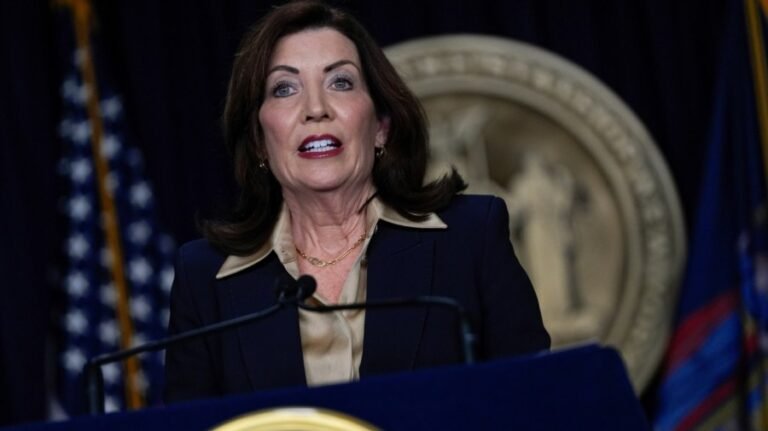
If President Trump really wants to change New York’s climate-crazed energy policies, he will need to do more than just huff and puff about an offshore wind farm.
Back in April, the federal government ordered a work-stop on the $5 billion Empire Wind project currently under construction off the coast of Long Island, only to reverse its decision with little explanation barely a month later. Ever since, talk has swirled about a backroom political deal between Gov. Kathy Hochul (D) and the White House, clearing the way for new natural gas pipelines to traverse the Empire State, as a trade for the Empire Wind restart.
Feeding the speculation, two long-abandoned interstate transmission projects were suddenly revived in recent months, one of which — a 23.5-mile underwater Northeast Supply Enhancement Pipeline across New York harbor — has already re-filed its New York state permit applications and completed a public comment period.
But don’t get your quid pro quo hopes up just yet. Publicly, Hochul has only stated that “New York will work with the [Trump] administration and private entities on new energy projects that meet the legal requirements under New York law.” Parsing her words, since New York state law effectively bans all new fossil fuel infrastructure projects, this means that she is just going through the regulatory motions.
Next to California, New York is one of the most anti-fossil fuel states in the union. For the past decade, climate ideology has held sway in Democrat-controlled Albany.
New York outlawed oil and gas drilling through its 2014 fracking ban, shut down all of its remaining coal-fired power plants and rejected every natural gas pipeline proposed (including the two now seemingly back from the dead). In 2019, the state passed the Climate Leadership and Community Protection Act, mandating 100 percent electric vehicle sales by 2035, an emissions-free state electricity grid by 2040 and a net-zero New York economy by 2050.
Since taking office, Hochul has doubled down on such bad energy policy. In 2023, she signed into law the All-Electric Building Act, which bans natural gas hook-ups for new building construction starting in 2026. Since electric heat is more expensive than natural gas and New York already has some of the highest residential power prices in the country (50 percent above the national average) this will mean more money needlessly flowing out of the pockets of New Yorkers.
She then upped the ante in late 2024 by expanding on the state’s fracking ban while also signing into law the Climate Change Superfund Act, which imposes a punitive $3 billion per year tax on oil and gas companies beginning in 2026. Notably, the ill-gotten gains from this new climate tax will be administered by the Department of Environmental Conservation, the same regulatory agency that would need to approve any new pipeline in the state.
New York’s Department of Environmental Conservation had previously denied a water permit for the proposed pipeline, on three different occasions between 2018 and 2020. Now, in the wake of Albany’s legislative and regulatory assault on fossil fuels over the intervening years, the gas pipeline’s approval prospects are even more doubtful, since the project is no longer compliant with state emissions policy and no longer needed due to New York’s state-sponsored natural gas demand destruction.
The likelihood that Hochul will have a Damascus moment and abandon her net-zero crusade would seem remote; Trump should stop trying to bargain for one-off energy projects and start playing hardball. Even if the political winds were to shift momentarily and the gas pipeline were to be greenlighted, it would not change the trajectory of New York’s energy policy and its extra-territorial reach.
Fossil fuels drive the American economy, so it is axiomatic that state policies that discriminate against the traditional energy industry necessarily interfere with interstate commerce and affect the national economy. New York state pipeline blockades deprive the New England region of natural gas from the Marcellus Shale in Pennsylvania. New York’s state-wide electricity grid, because it is interconnected, places a burden on neighboring transmission organizations to make up for its self-inflicted power shortages. New York’s ban on gasoline-powered cars forces out-of-state automobile manufacturers to sell vehicles that consumers aren’t demanding.
While New York is an extreme example, many other blue states have instituted similar anti-fossil fuel policies that run counter to the climate deregulation now taking place at the federal level. To avoid a balkanized national energy system, the Trump administration should leverage the court system to once and for all establish federal preemption in the intertwined domains of environmental and energy policy, no different than with immigration or monetary policy
Recent Supreme Court decisions have reasserted congressional authority over matters of major economic and political importance, including energy policy, while also clawing back regulatory power in these areas from executive agencies. The next logical step would be to rein in the states. New York’s comprehensive anti-fossil fuel policies offer an ideal test case for Supreme Court review and imprimatur.
Kathy Hochul and the Democrats running New York with impunity will not give up on their climate agenda willingly. It’s time for the Trump administration to start suing to finally establish federal supremacy for American energy policy.
Paul Tice is a senior fellow at the National Center for Energy Analytics and author of “The Race to Zero: How ESG Investing Will Crater the Global Financial System.”

